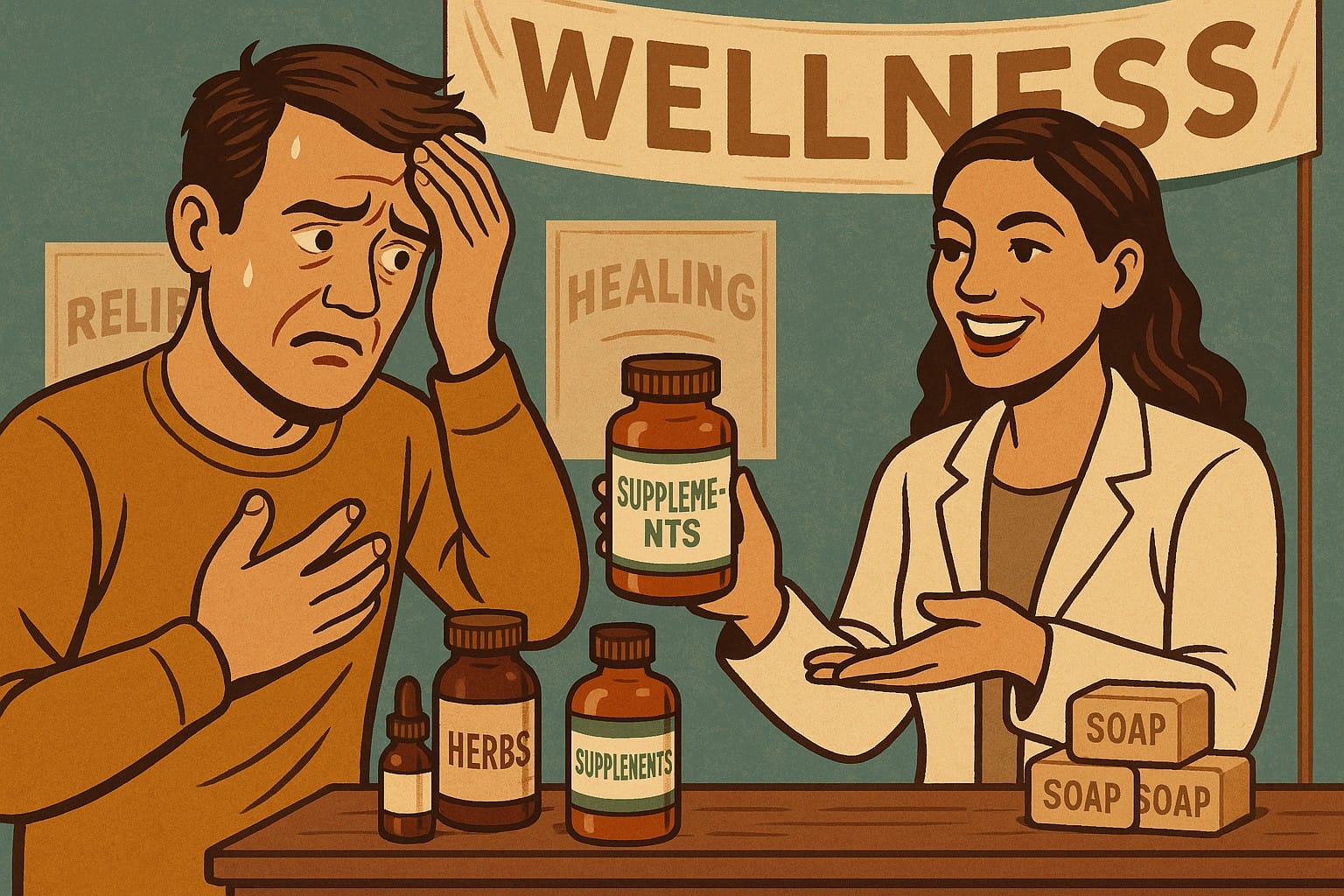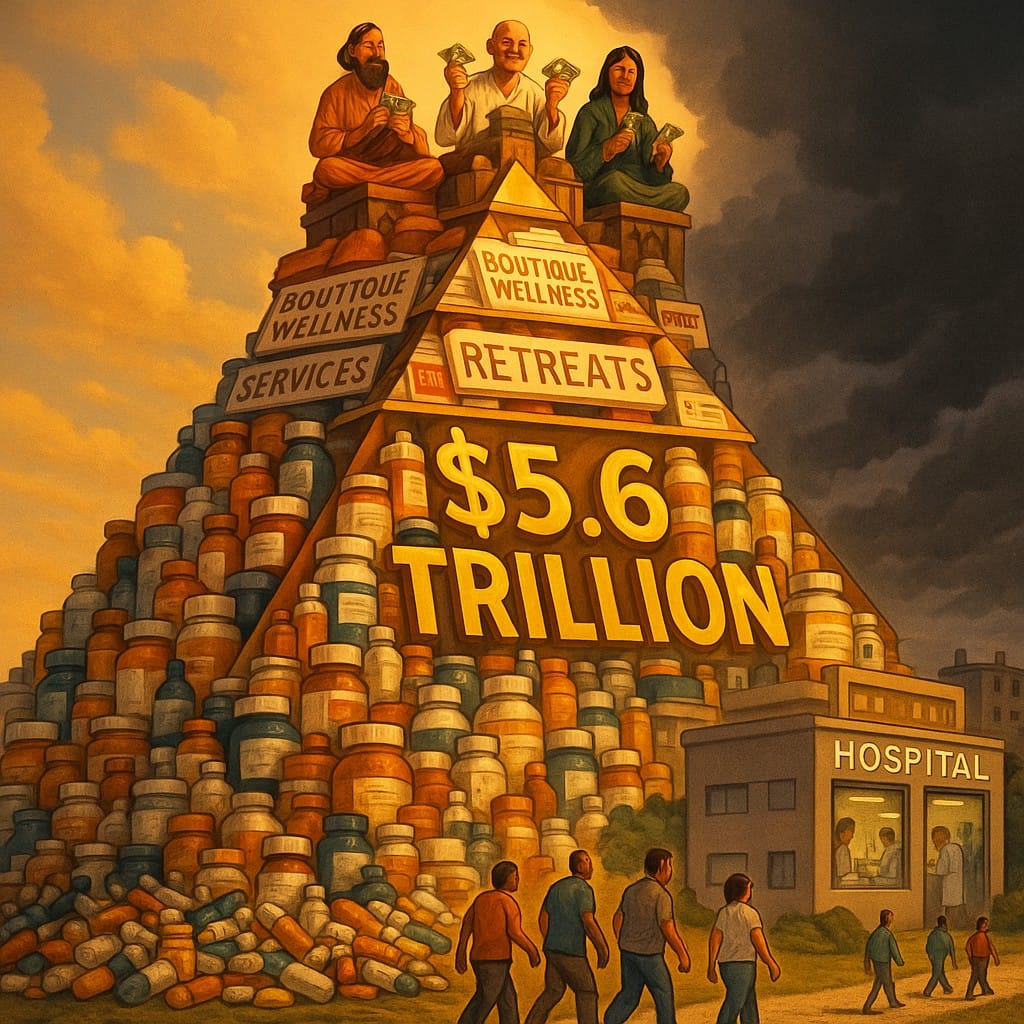How the industry profits from pain, psychology, and the promise of healing
Here's what the wellness industrial complex understands about human psychology that would make Madison Avenue weep with envy: We're hardwired to believe that suffering has meaning. When something hurts, we desperately need it to hurt for a reason.
Traditional medicine often can't provide that meaning. Your doctor tells you that your chronic pain might just be... chronic pain. There is no grand narrative. There is no villain to defeat. No hero's journey, just "here's some physical therapy and maybe try this medication."
But wellness? Oh, wellness gives you the full mythology package. Pain is your body's wisdom, and it isn't random. Depression isn't a complex neurochemical condition - it's your soul crying out because you're not living your authentic truth. Anxiety isn't a disorder - it's your intuition trying to protect you from toxic energy.
This is psychological heroin. It transforms meaningless suffering into meaningful struggle and meaningless struggle into a consumer identity.
The Regulation Black Hole
Want to know how broken this system is? Let me tell you about the supplement industry, which operates in a regulatory fantasyland.
In 1994, the US Congress passed the Dietary Supplement Health and Education Act, which basically said: "Hey supplement companies, police yourselves!" It's like handing the keys to the evidence locker to the guy you just arrested for robbery.
Under this law, supplement companies can make almost any claim they want as long as they include the magical disclaimer: "This statement has not been evaluated by the Food and Drug Administration." It's the legal equivalent of saying "I'm not touching you" while holding your finger an inch from someone's face.
So, while pharmaceutical companies spend an average of $1.3 billion and 10-15 years getting a single drug to market, someone can slap "Ancient Tibetan Penis Root Extract" into a capsule, claim it cures everything from erectile dysfunction to existential dread, and have it on shelves next Tuesday.
The result is a $40 billion supplement market where roughly 70% of products don't contain what their labels claim, and about 12% contain potentially harmful contaminants. But at least they're "natural."

The Influencer Pipeline to Pseudoscience
Social media didn't create wellness grifters, but it gave them superpowers. Here's how the modern wellness influencer ecosystem works:
Phase 1: The Authentic Struggle Someone has a real problem - depression, chronic illness, whatever. They try conventional treatment, but it doesn't work perfectly (because nothing works perfectly), so they start experimenting with alternatives.
Phase 2: The "Discovery". They find something that seems to help. It could be actual correlation, a placebo effect, or just natural recovery timing. Doesn't matter - in their mind, they've cracked the code.
Phase 3: The Testimony. They share their story online. "Doctors couldn't help me, but this one weird trick changed everything!" The algorithm loves authentic vulnerability, so it gets pushed to thousands of people with similar struggles.
Phase 4: The Empire Suddenly, they're the experts. Brands want partnerships. People want consultations. They launch courses, write books, and develop product lines. Their entire financial survival becomes dependent on maintaining the narrative that conventional medicine failed them, but their special method saved them.
Phase 5: The Escalation. To differentiate themselves in a crowded market, they must make bigger claims, attack conventional medicine more aggressively, and embrace more outlandish theories. The moderate wellness influencer becomes the radical wellness guru because moderation doesn't pay the bills.
This pipeline has created thousands of mini cults, each centred around someone who believes their personal experience is a universal truth.
The Trauma-to-Product Pipeline
Here's where it gets really dark: The wellness industry has figured out how to monetize trauma in ways that would make a loan shark blush.
Take "functional medicine" practitioners. They've perfected the art of trauma-informed sales funnels. The consultation starts with extensive intake forms about your childhood, your relationships, and your deepest fears. They're not diagnosing; they're building a psychological profile for targeted marketing.
Then comes the revelation: "Your chronic fatigue isn't just chronic fatigue - it's your body holding onto generational trauma!" Suddenly, your grandmother's anxiety becomes a metabolic disorder that requires a $300/month supplement protocol and a $2,000 intensive healing retreat.
They've weaponized therapeutic language to sell products. "Healing your inner child" becomes code for "buying our online course." "Trauma-informed care" becomes "trauma-monetized commerce."

The Class Warfare Angle
Let's talk about who can afford to be this delusional. Premium wellness is a luxury product marketed as a universal truth, and that creates stomach-churning dynamics.
Rich people experiment with $200 vitamin IVs and boutique therapy approaches while claiming they've found the "real" path to health. Poor people are sold the same ideology through MLM schemes and discount supplements, but without the safety net of actual medical care when things go wrong.
This creates a two-tier system where wealthy people get wellness as a lifestyle accessory (with real medicine as backup), while the working-class get wellness as a replacement for the healthcare they can't afford.
The cruellest part? The wellness industry turns this inequality into a moral judgment. If the expensive treatments work better (because they're layered on top of actual medical care), it's because the wealthy people were "more committed to their healing journey."
The Mental Health Massacre
The intersection of wellness culture and mental health treatment is where it stops being funny and starts being genuinely terrifying.
We've created a culture where seeking psychiatric treatment is seen as giving up, while paying a life coach $200/hour to help you "reprogram your limiting beliefs" is seen as taking responsibility for your healing.
Therapists report that clients now regularly show up demanding that therapy work like wellness coaching. They want no exploration of difficult emotions, no sitting with uncertainty, just techniques and strategies that promise quick relief. When it doesn't work like a productivity hack, clients bail for whatever guru promises faster results.
Meanwhile, the wellness industry has co-opted therapeutic language while stripping away all ethical boundaries. Anyone can call themselves a "healer" or a "trauma specialist" regardless of training. There's no licensing board, no malpractice insurance, no duty of care.
The result is a shadow mental health system where vulnerable people get charged premium prices for advice that ranges from useless to actively harmful. Practitioners face zero consequences for fucking up people's lives.
The Global Export of American Crazy
Here's something that'll keep you up at night: We're exporting this madness worldwide.
American wellness companies are aggressively expanding into developing countries. They are bringing anti-vaccine messaging, supplement dependency, and medical distrust to places where these attitudes can cause genuine public health disasters.
Countries that have spent decades building trust in vaccination programs are watching measles outbreaks spread through communities targeted by wellness influencers preaching "natural immunity." Traditional healing practices that have worked for centuries are being commercialized and bastardized by Western wellness companies looking for "exotic" ingredients to market.
It's cultural imperialism disguised as empowerment, and it's killing people.
The Algorithmic Amplification Problem
Social media algorithms have become the perfect breeding ground for wellness misinformation because they reward engagement over accuracy. Nothing drives engagement quite like someone promising they have the secret cure that "they" don't want you to know about.
The algorithm learns that wellness content keeps people scrolling, so it feeds them more. A person searches for help with insomnia, and six months later, they're deep in a rabbit hole about adrenal fatigue, heavy metal detox, and probably some light anti-Semitism.
YouTube's recommendation engine has become a radicalization pipeline from yoga videos to QAnon, and the wellness industry provides the perfect bridge between self-improvement and conspiracy thinking.
The Institutional Capture
Perhaps the most insidious development is how wellness ideology has infiltrated legitimate institutions. Universities offer "integrative medicine" programs that teach homeopathy alongside biochemistry. Hospitals create "wellness centers" that offer energy healing next to cardiac surgery.
This institutional endorsement provides credibility that individual grifters could never achieve on their own. When Johns Hopkins offers a "Reiki Master Training," it lends legitimacy to the entire field of energy healing.
Medical schools are now teaching future doctors to be "respectful" of alternative approaches. This sounds progressive, but often translates to "don't challenge obvious bullshit because it might hurt feelings."
The Innovation Stagnation
Here's an economic argument that should terrify anyone who cares about actual medical progress: Every dollar spent on useless wellness products is a dollar not invested in real research.
While we're spending billions on adaptogens and crystal therapy, we're chronically underfunding research into chronic pain, mental health, and the kinds of complex conditions that drive people toward alternative medicine in the first place.
The wellness industry has created a massive opportunity cost. If we had invested their marketing budgets in actual science, we could have cured half the shit these people are selling fake treatments for.
The Solution Framework
So, what do we do? Because complaining about the problem is satisfying but ultimately useless.
First: Regulation with teeth. We need supplement companies to prove their products work before they can sell them, just like pharmaceutical companies do. The current system is insane.
Second: Medical education reform. Doctors need training in how to communicate uncertainty without losing patient trust. When someone is desperate for answers and you say, "We don't know," you need to offer something more than "come back in six weeks."
Third: Economic alternatives. We need to make legitimate mental health care, chronic pain management, and preventive medicine accessible enough that people don't turn to wellness grifters out of desperation.
Fourth: Digital literacy. We need to teach people how to evaluate health claims online, because most people can't tell the difference between a peer-reviewed study and a blog post with footnotes.
Fifth: Cultural shift. We need to stop treating suffering as a problem to be solved and start treating it as an experience to be supported. Not everything has a cure, and that's not a personal failing.
The wellness industry thrives on our inability to sit with uncertainty, accept limitations, and tolerate the basic messiness of being human. Until we get comfortable with those realities, we will keep throwing money at people who promise to make them go away.
And they won't go away because they can't. That's not how bodies work, how minds work, or how life works.
But admitting that doesn't sell supplements.
I don't sell memberships or anything, but if you want to buy me a beer, I won't refuse.


